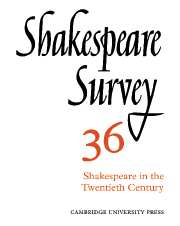Book contents
- Frontmatter
- Shakespeare and the Living Dramatist
- Blood and Wine: Tragic Ritual from Aeschylus to Soyinka
- Hamlet Andante/Hamlet Allegro: Tom Stoppard’s Two Versions
- Auden, Shakespeare, and the Defence of Poetry
- Graves on Lovers, and Shakespeare at a Lovers’ Funeral
- Tragic Balance in Hamlet
- Hamlet Across Space and Time
- Shakespeare’s Scripts and the Modern Director
- ‘He Shall Live a Man Forbid’: Ingmar Bergman’s Macbeth
- Komisarjevsky at Stratford-upon-Avon
- Troilus and Cressida and the Definition of Beauty
- The Pastoral Reckoning in Cymbeline
- New Created Creatures: Ralph Crane and the Stage Directions in The Tempest
- Arden of Faversham
- ‘Pickleherring’ and English Actors in Germany
- Shakespeare Performances in Stratford-upon-Avon and London, 1981–2
- The Year's Contributions to Shakespearian Study 1 Critical Studies
- 2 Shakespeare’s Life, Times and Stage
- 3 Textual Studies
- Index
- Plate Section
Shakespeare and the Living Dramatist
Published online by Cambridge University Press: 28 March 2007
- Frontmatter
- Shakespeare and the Living Dramatist
- Blood and Wine: Tragic Ritual from Aeschylus to Soyinka
- Hamlet Andante/Hamlet Allegro: Tom Stoppard’s Two Versions
- Auden, Shakespeare, and the Defence of Poetry
- Graves on Lovers, and Shakespeare at a Lovers’ Funeral
- Tragic Balance in Hamlet
- Hamlet Across Space and Time
- Shakespeare’s Scripts and the Modern Director
- ‘He Shall Live a Man Forbid’: Ingmar Bergman’s Macbeth
- Komisarjevsky at Stratford-upon-Avon
- Troilus and Cressida and the Definition of Beauty
- The Pastoral Reckoning in Cymbeline
- New Created Creatures: Ralph Crane and the Stage Directions in The Tempest
- Arden of Faversham
- ‘Pickleherring’ and English Actors in Germany
- Shakespeare Performances in Stratford-upon-Avon and London, 1981–2
- The Year's Contributions to Shakespearian Study 1 Critical Studies
- 2 Shakespeare’s Life, Times and Stage
- 3 Textual Studies
- Index
- Plate Section
Summary
Your statement is an impudently ignorant one to make . . . Do you really mean no one should or could write about or speak about a war because one has not stood on the battlefield . . .? Was Shakespeare at Actium or Philippi . . .?
That tart response from Sean O’Casey to Yeats will be familiar to many. O’Casey is not of course a ‘living’ dramatist, but I am certain that no one here expects a coroner’s interpretation of that expression. O'Casey could have picked no worthier defender of his arguments; the universal puzzle of Shakespeare's evocative power often leads to speculations – in various degrees of whimsy - about his real identity. That is only another way of questing after the unrecorded things he actually did in real life - especially in the area of travel. If Shakespeare was never at Actium or Philippi contemporaneously with the events which he dramatized on these sites, he must have stood on their ruins or visited their living replicas in his wanderings - preferably press-ganged into one of those notorious merchant ships while he was hanging around the theatres, waiting to audition for a small role. Is it any wonder that the Middle Eastern poets and dramatists claim that he must, at the very least, have been a sometime visitor to North Africa and the Arabian peninsula? How else, for instance, could he have encountered the legend of Majnun Layla which he transformed - albeit without acknowledgement - into Romeo and Juliet? And so Ali Ahmad Ba-Kathir (who died in 1969), an Indonesian-born poet who became a naturalized Egyptian, restored to his adopted race what belonged to Arab literature in the first place - he translated Romeo and Juliet into Arabic free verse.
- Type
- Chapter
- Information
- Shakespeare Survey , pp. 1 - 10Publisher: Cambridge University PressPrint publication year: 1983
- 1
- Cited by

